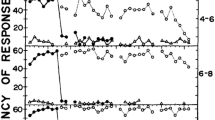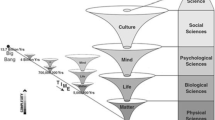Abstract
In a behavioral view, the purposes of science are primarily prediction and control. To the extent that a scientist embraces both of these as a unified and generally applicable criterion for science, certain philosophical and theoretical practices are counterproductive, including mentalism in both its metaphysical and metatheoretical forms. It is possible and often worthwhile to recast some mentalistic talk into an issue of behavior-behavior relations. When behavior-behavior relations are approached non-mechanistically, however, analysis cannot stop at the level of the relations themselves. Several analytic concepts common in the behavioral community share some of the dangers of mentalism if not employed properly, including such concepts as self-reinforcement, response-produced stimulation, and self-rules.
Similar content being viewed by others
References
Bandura, A. (1978). The self system in reciprocal determinism. American Psychologist, 33, 344–358.
Bandura, A. (1981). In search of pure unidirectional determinants. Behavior Therapy, 12, 30–40.
Catania, A. C. (1973). The psychologies of structure, function, and development. American Psychologist, 28, 434–443.
Dawkins, R. (1982). The extended phenotype. San Francisco: Freeman.
Ellis, H. C., & Hunt, R. R. (1983). Fundamentals of human memory and cognition (3rd ed.). Dubuque, IO: W. C. Brown.
Ericsson, K. A., & Simon, H. A. (1984). Protocol analysis: Verbal reports as data. Cambridge, MA: MIT Press.
Harris, M. (1979). Cultural materialism: The struggle for a science of culture. New York: Random House.
Hayes, S. C. (1986). The case of the silent dog-Verbal reports and the analysis of rules: A review of Ericsson and Simon’s “Protocol analysis: Verbal reports as data”. Journal of the Experimental Analysis of Behavior, 45, 351–363.
Hayes, S. C., & Reese, H. W. (in press). A review of S. C. Pepper’s “World Hypotheses: A Study in Evidence.” Journal of the Experimental Analysis of Behavior.
Hayes, S. C., Rosenfarb, S. C., Wulfert, E., Korn, Z., & Zettle, R. D. (1985). Self-reinforcement procedures: Another way to set social standards? Journal of Applied Behavior Analysis, 18, 201–214.
Heidbreder, E. (1933). Seven psychologies. New York: Appleton-Century-Crofts.
Keat, R. (1972). A critical examination of B. F. Skinner’s objections to mentalism. Behaviorism, 1, 53–70.
Killeen, P. R. (1984). Emergent behaviorism. Behaviorism, 12, 25–39.
Locke, J. (1690). An essay concerning human understanding. London: Awnsham, Churchill, & Manship.
Malott, R. W. (in press) The achievement of evasive goals: Control by rules describing indirect-acting contingencies. In S. C. Hayes (Ed.), Rule-governed behavior: Cognition, contingencies, and instructional control. New York: Plenum.
Martin, M. (1978). Interpreting Skinner. Behaviorism, 6, 129–138.
Moore, J. (1981). On mentalism, methodological ]behaviorism, and radical behaviorism. Behaviorism, 9, 55–77.
Ornstein, P. A., & Naus, M. J. (1978). Rehearsal processes in children’s memory. In P. A. Ornstein (Ed.), Memory development in children (pp. 6999). Hillsdale, NJ: Erlbaum.
Pepper, S. C. (1942). World hypotheses. Berkeley: University of California Press.
Reese, H. W. (May, 1984). Historical and philosophical analysis of causality. Paper presented at the meeting of the Association for Behavior Analysis, Nashville.
Skinner, B. F. (1945). The operational analysis of psychological terms. Psychological Review, 52, 270–276.
Skinner, B. F. (1953). Science and human behavior. New York: Free Press.
Skinner, B. F. (1963). Behaviorism at fifty. Science, 134, 566–602.
Skinner, B. F. (1969). Contingencies of reinforcement: A theoretical analysis. New York: Appleton-Century-Crofts.
Skinner, B. F. (1974). About behaviorism. New York: Knopf.
Skinner, B. F. (1984). Reply to Catania. The Behavioral and Brain Sciences, 7, 718–719.
Sohn, D., & Lamal, P. A. (1982). Self-reinforcement: Its reinforcing capability and its clinical utility. The Psychological Record, 32, 179–203.
Watson, J. B. (1920). Is thinking merely the action of language mechanisms? British Journal of Psychology, 11, 87–104.
Watson, J. B. (1925). Behaviorism. New York: Norton.
Wessells, M. G. (1981). A critique of Skinner’s views on the explanatory inadequacy or cognitive theories. Behaviorism, 9, 153–170.
Wessells, M. G. (1982). A critique of Skinner’s views on the obstructive character of cognitive theories. Behaviorism, 10, 65–84.
Author information
Authors and Affiliations
Additional information
This paper is published in loving memory of Aaron J. Brownstein (1932–1986). We will miss you, old friend.
Rights and permissions
About this article
Cite this article
Hayes, S.C., Brownstein, A.J. Mentalism, Behavior-Behavior Relations, and a Behavior-Analytic View of the Purposes of Science. BEHAV ANALYST 9, 175–190 (1986). https://doi.org/10.1007/BF03391944
Published:
Issue Date:
DOI: https://doi.org/10.1007/BF03391944




